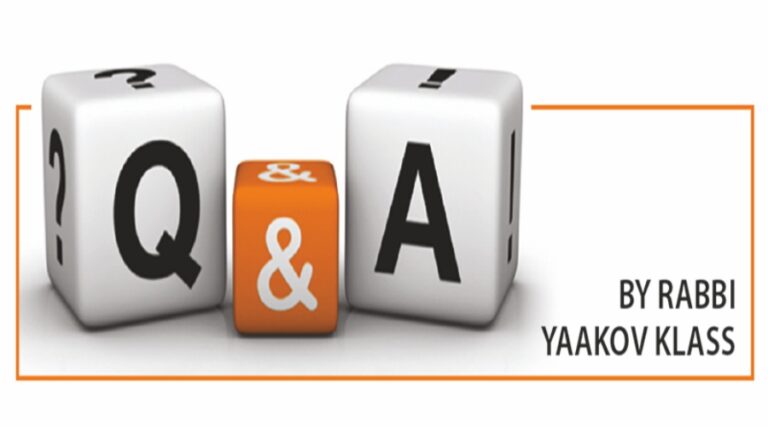Question: As I came into the synagogue, they were about to recite Keriâat Shema. I had as yet not put on my tefillin. What should one do in that situation?
A Reader
Via E-mail
Synopsis: We noted last week that in this situation, although one does not have his tefillin on, he should nevertheless recite the first verse of Shema and âBaruch Shem kâvodâ with the congregation. We also noted that the chazzan should raise his voice for all to hear so they will be able to join him. The Mechaber noted that this applies even to one who has already discharged his obligation; he too is to join in. We also cited different views as regards one who is the midst of his tefillah as to where he may or may not interrupt.
* * *
Answer: It is important to note that Keriâat Shema actually consists of three parashiyot. The first group of pesukim comes from Parashat Vaâetâchanan (Deuteronomy 6:4-9); the second from Parashat Ekev (Deuteronomy 11:13-21), and the third from Parashat Shelach (Numbers 15:37-41). It has been accepted that to discharge our obligation of the Shema recital, we are to recite all three parashiyot. Thus it is only when we mention an interruption that we talk of reciting less than the full three parashiyot.
As we concluded last week with the Mishna Berurahâs ruling (Orach Chayyim 65:sk6), we interrupt only in the midst of Pesukei dâZimrah and only for the first verse of the Shema (âShema Yisraelâ¦â) and âBaruch Shem kâvodâ¦â in order that one joins in with the congregation. As to his reasoning, this is based on the Gemara (Berachot 13b): âOur rabbis taught: âShema Yisrael Hashem Elokeinu Hashem Echadâ â this is the [required] recitation of Shema according to Rabbi Judah HaNasi. [Of course we include Baruch Shemâ¦â]
The Gemara (supra ad loc.) also states another rule in the name of Rav Nassan bar Mar Ukba in the name of Rav Judah, that the portions until âal levoâvechaâ (on your heart) must be said while standing. But Rav Yochanan rules that we must stand for the entire [first] parasha, and this follows Rabba bar bar Chana who rules like Rav Yochanan, who in turn cites [that same ruling] in the name of Rav Judah.
Now, what is meant by standing? Does it mean that we are to rise and stand when we recite the Shema? Tosafot (op.cit. âal levoâvechaâ) cite the Jerusalem Talmud that it does not mean that if one was sitting he is to stand up to recite Shema. Rather, it means that if one was walking along his way and he was reciting the Shema (perhaps as the latest time of the day to recite it was approaching), he need stop and stand still while he recites that first parasha.
Here we must understand the primacy of Keriâat Shema which is such that it seems to supersede all other tefillot. The Gemara (Pesachim 56a), referring to the Mishnaâs (supra 55b) statement that of the three things that the inhabitants of Jericho did that were found favorable to the Sages, one of them was that they did not pause in the recitation of Shema between the first verse âShema Yisrael Hashem Elokeinu Hashem echadâ and âVâahavta et Hashem Elokechaâ¦â until the end, explains this as R. Meirâs view. R. Judah, however, states that they did interrupt when they recited âBaruch Shem kâvod malchuto lâolam vaâedâ â Blessed be the glorious name of His kingdom for ever and ever.
Now the Gemara refers to our practice in accord with the view of R. Judah. And what is the reason that we recite âBaruch Shem kâvod malchuto?â As Reish Lakish said, [the Torah in Parashat Vaâyechi (Genesis 49:1) relates,] âAnd Jacob called unto his sons, and said: âGather yourselves together, that I may tell you that which shall befall you in the end of days.â Jacob wished to reveal the âketzâ â the end of days â whereupon the Shechina â the Divine Presence â departed him. He said, âPerhaps, Heaven forbid, there is one from among my sons who is unfit, like [my grandfather] Abraham, who had Ishmael [and the sons of Keturah], or like my father Isaac, who had Esau.â They responded: âHear O Israel, the Eternal L-rd, our G-d, the Eternal L-rd is One: Just as there is only One in your heart, so is there only One in our heart.â It was at that moment that the patriarch Jacob opened up and exclaimed, âBaruch Shem kâvod malchuto lâolam vaâedâ â Blessed be the glorious name of His kingdom forever and ever.â
Said the Rabbis, How shall we act? Shall we recite it [âBaruch Shemâ¦â] â yet our teacher Moses did not say it (Deuteronomy 6: 4-9); however Jacob did say it! Therefore, they enacted that it [should be included but] be recited quietly.
Thus we see that this prayer, our declaration of belief in Hashem, is most fundamental to Judaism.
It was with this in mind that the Anshei Knesset HaGedolah (the Men of the Great Assembly), among them many prophets with Divine vision, who enacted the text to all our prayers, gave primacy to this unique clarion call of our fealty to Hashem, our Creator, the Creator of all.
Indeed, in times of persecution, emperors and tyrants forbade our reciting this prayer.

